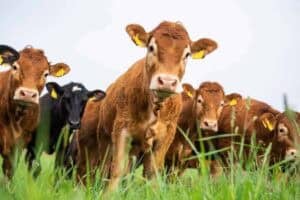Dry weather and climate shifts threaten South Africa's agricultural output, with national food security at risk.

Agricultural production is plummeting and farmers are worried that if the situation worsens, food security will be threatened, as dry weather conditions continue.
A farmer, Dre Schalekamp, who grows maize and soya beans and supplies some of the country’s big supermarket chains through a cooperative, said his production level had slumped.
“Changing weather patterns are affecting our production compared to the three previous years.
“Our production has slumped by almost 40%. To continue operating we need more rainfall.”
Schalekamp also breeds cattle at his farm in Fochville, a farming and mining town in Merafong on the West Rand of Gauteng.
“We are also facing a situation of cattle suffering because the grass is growing slowly, forcing me to buy food for the livestock which is costly.”
He said that since he took over the farm from his father in 2000, this was the first time he had experienced such unpredictable weather conditions with heatwaves and drought. “What worsens it is that most farmers depend on rain for irrigation,” said Schalekamp.
Food security takes a hit
Head of AgriSA’s Natural Resource Centre of Excellence and a commissioner of the Presidential Climate Commission Janse Rabie said the country’s maize production was down about 25% compared to the previous year.
He said the sharp decline was due to the harsh effect of extreme heat and a midsummer drought.
Rabie added that Northern Cape-based livestock farmers were most affected. He encouraged farmers to continue learning innovative ways to make their business survive the “ongoing natural disaster”.
Rabie said maize and potatoes were the crops most affected by the unpredictable weather patterns. Statistics released by South Africa’s crop estimates committee on 28 August showed the current maize harvest was 13.06 million tons, which is down by 21% from the 2022-23 season.
Another farmer, Danie Bester, based in Balfour in Mpumalanga, called on the government to help deal with the effects of the drought that has engulfed parts of the country.
Bester, a livestock farmer who also produces soya beans for various supermarkets, is worried because his farm’s output is down by approximately 6% compared to the previous three years.
He attributes this to the problems associated with weather changes.
“We rely on rainfall for irrigation because my dams are also running dry due to the drought that has engulfed the province.
“I always devise plans to ensure the cattle get enough water and the crops are not drying up.
ALSO READ: Food security in SA lowest in decade, child hunger a major issue – index
Farmers want government to do more
“As much as we try our best to keep producing food, our government must also play a role and assist us where they can.
“I am not saying we need handouts, but they must meet us halfway by reducing tax as we are losing a lot of profit,” Bester said.
He was worried about what would happen if the weather conditions did not improve.
“With these changing weather patterns, we are failing to plan properly. Sometimes there is too much rain, which is not good during planting season, and then we have scorching sun.
“Our agricultural production is slumping due to less rainfall and heatwaves. Over the past three years, we have been producing enough.
“But if this situation continues it will affect us because there are full-time employees benefiting from the existence of the farm.”
ALSO READ: HRC to probe denial of food to pupils at Mpumalanga schools
Expert urges farmers to conserve rainwater
Rainwater harvesting expert Dr Wilma van Staden urged farmers to conserve rainwater to avert slumping food production.
“Rainwater harvesting is becoming critical due to the growing challenges of water scarcity,” she said.
Agribusiness chief economist Wandile Sihlobo said there was hope, even though the 2023-24 summer crop season was challenging, resulting in the country’s grains and oilseeds production plummeting by 24% year-on-year to 15.39 million tons.
“Recovery may be in sight. The data released by the crop estimates committee shows that farmers intend to plant 4.47 million hectares of summer grains and oilseeds in the 2024-25 season. This is 1% up from the previous season.”
ALSO READ: Steenhuisen’s Agricultural Master Plan sparks concerns, farmers call for consultation






